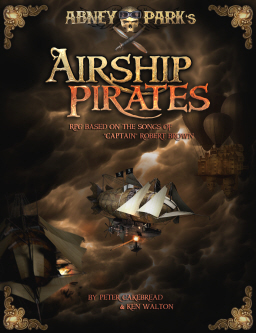 Last month, Peter Cakebread of Cakebread & Walton told you about our alternate English Civil War fantasy RPG, Clockwork & Chivalry. This month, it’s Ken Walton here, and I’ll be taking a look at our music-inspired steampunk extravaganza, Abney Park’s Airship Pirates RPG.
Last month, Peter Cakebread of Cakebread & Walton told you about our alternate English Civil War fantasy RPG, Clockwork & Chivalry. This month, it’s Ken Walton here, and I’ll be taking a look at our music-inspired steampunk extravaganza, Abney Park’s Airship Pirates RPG.
“Abney Park?” I hear some of you say. “Isn’t that a cemetery in London?” While the rest of you are saying, “No, Abney Park is a really cool steampunk band from Seattle who play music like this.”
Most of their songs, written by lead singer “Captain” Robert Brown, tell of the fictional exploits of the band in their time-travelling steampunk airship Cordelia. On discovering their music, we quickly realised there was a really cool background here that would make a kick-ass role-playing game.
We contacted the band, thinking, “This is mad, they’ll never go for it, no-one’s ever written a RPG based on a band’s songs!” But Captain Robert thought the idea was awesome.
When we emailed our publisher, Cubicle 7, Angus Abranson (who worked at Cubicle 7 at the time) was on the phone in five minutes. “Why didn’t I think of that?” Turned out he was an Abney Park fan too. Who knew? And so, a new game was born!
Of course, then we had to sit down and design it. Cubicle 7 offered us use of the game mechanics from their Victoriana RPG, which we tweaked and simplified for a more swashbuckling feel.
Captain Robert, it turned out, was a graphic artist as well as a rock star, and he designed the look of the game, as well as recruiting a host of amazing artists to contribute the full-colour artwork for the rulebook. And we took the song lyrics and Robert’s (then unfinished) novel, The Wrath of Fate, and set about expanding them into a game world with a particular feel.
…
Read More Read More

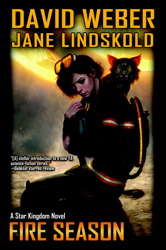
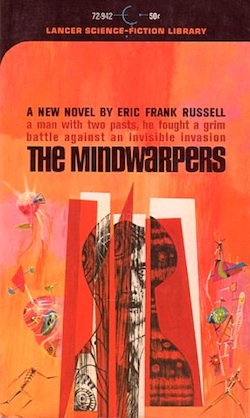


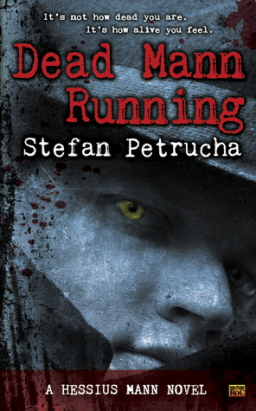
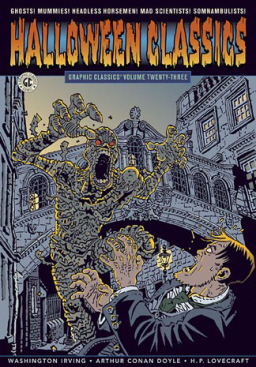

 I realized yesterday that my hard learned lesson about publishing (“it’s a long distance run, not a sprint”) can’t help someone dying of cancer. What do you say to someone who will mostly likely be dead before she reaches the age you were when you first got a book contract?
I realized yesterday that my hard learned lesson about publishing (“it’s a long distance run, not a sprint”) can’t help someone dying of cancer. What do you say to someone who will mostly likely be dead before she reaches the age you were when you first got a book contract? Some time ago, at one book fair or another, I took a chance on a book I’d never heard of: Black Wine by Candas Jane Dorsey. I’m not sure why; I’d already had reasonable luck at the sale, as I recall, so I didn’t feel the need (as one sometimes does) to grab a book for the sake of coming away with something. I don’t normally buy books based on cover art, and in any case this cover was more stylish than striking, a black pattern on black. It may have been the mention on the cover that the book had won an award for Best First Fantasy Novel. Most likely, it was the puff quotes on the back, featuring praise from Elisabeth Vonarburg and Ursula Le Guin (who compared Dorsey to Gene Wolfe). At any rate, buy it I did, for whatever reason; and having finally gotten around to reading it, I’m happy I went for it. Black Wine is an excellent, excellent book.
Some time ago, at one book fair or another, I took a chance on a book I’d never heard of: Black Wine by Candas Jane Dorsey. I’m not sure why; I’d already had reasonable luck at the sale, as I recall, so I didn’t feel the need (as one sometimes does) to grab a book for the sake of coming away with something. I don’t normally buy books based on cover art, and in any case this cover was more stylish than striking, a black pattern on black. It may have been the mention on the cover that the book had won an award for Best First Fantasy Novel. Most likely, it was the puff quotes on the back, featuring praise from Elisabeth Vonarburg and Ursula Le Guin (who compared Dorsey to Gene Wolfe). At any rate, buy it I did, for whatever reason; and having finally gotten around to reading it, I’m happy I went for it. Black Wine is an excellent, excellent book.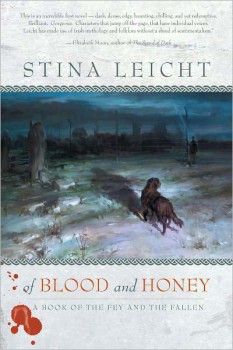 Of Blood and Honey
Of Blood and Honey